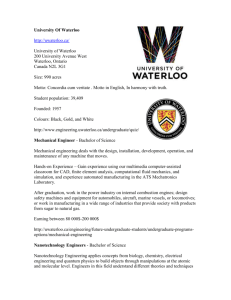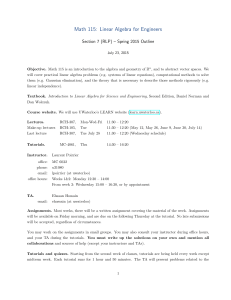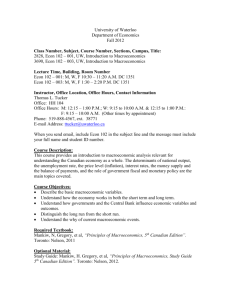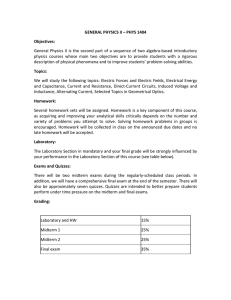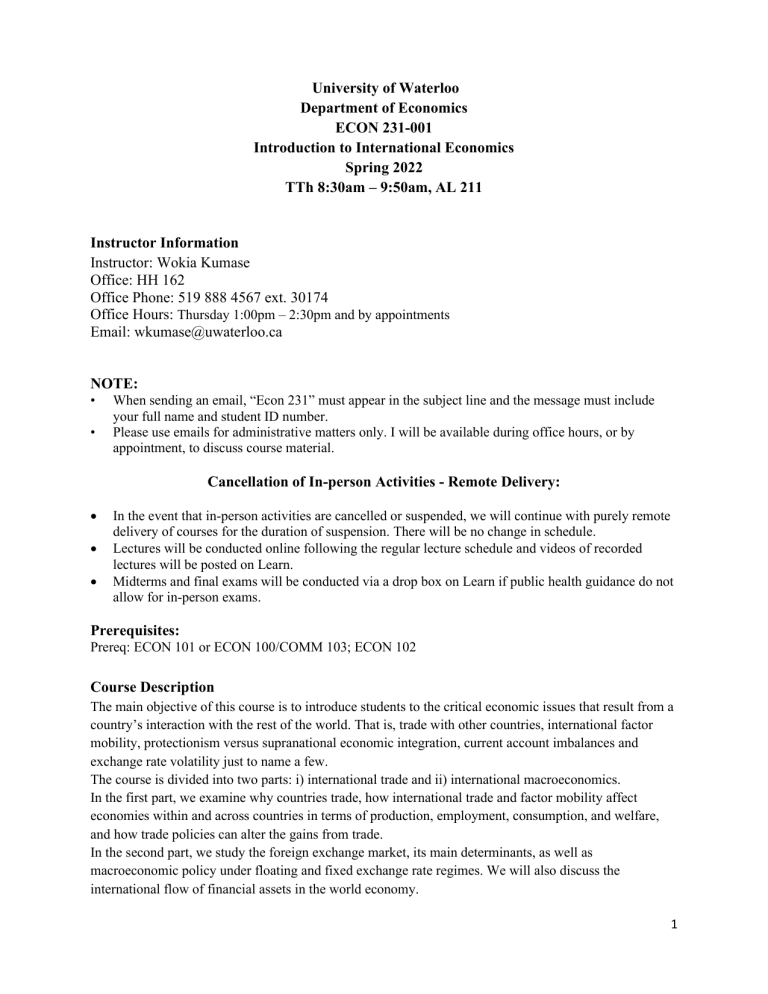
University of Waterloo Department of Economics ECON 231-001 Introduction to International Economics Spring 2022 TTh 8:30am – 9:50am, AL 211 Instructor Information Instructor: Wokia Kumase Office: HH 162 Office Phone: 519 888 4567 ext. 30174 Office Hours: Thursday 1:00pm – 2:30pm and by appointments Email: wkumase@uwaterloo.ca NOTE: • • When sending an email, “Econ 231” must appear in the subject line and the message must include your full name and student ID number. Please use emails for administrative matters only. I will be available during office hours, or by appointment, to discuss course material. Cancellation of In-person Activities - Remote Delivery: • • • In the event that in-person activities are cancelled or suspended, we will continue with purely remote delivery of courses for the duration of suspension. There will be no change in schedule. Lectures will be conducted online following the regular lecture schedule and videos of recorded lectures will be posted on Learn. Midterms and final exams will be conducted via a drop box on Learn if public health guidance do not allow for in-person exams. Prerequisites: Prereq: ECON 101 or ECON 100/COMM 103; ECON 102 Course Description The main objective of this course is to introduce students to the critical economic issues that result from a country’s interaction with the rest of the world. That is, trade with other countries, international factor mobility, protectionism versus supranational economic integration, current account imbalances and exchange rate volatility just to name a few. The course is divided into two parts: i) international trade and ii) international macroeconomics. In the first part, we examine why countries trade, how international trade and factor mobility affect economies within and across countries in terms of production, employment, consumption, and welfare, and how trade policies can alter the gains from trade. In the second part, we study the foreign exchange market, its main determinants, as well as macroeconomic policy under floating and fixed exchange rate regimes. We will also discuss the international flow of financial assets in the world economy. 1 Course Participation Policy: • Lecture slides and a summary of the points highlighted on the slides will be posted on LEARN on a weekly basis. • Though you may work on our class anytime you like during the week, you will need to complete the quizzes as scheduled. Also note that penalties will apply for missing quiz deadlines. • It is advisable to spend at least 5 hours each week, reading, completing quizzes and assignments for this class. However, the choice of WHEN and HOW long you work each week is up to you. Learning Outcomes: • Explain the patterns of trade and their determinants. • Understand the distributional consequences of international trade in goods. • Explain the consequences of trade policy: tariffs, quotas, etc. • Understand exchange rates, their definitions, and main determinants. Required Textbook: Krugman, R. Paul, Maurice Obstfeld & Marc J. Melitz: International Economics: Theory and Policy, 11thEdt., Pearson Wesley Publishers Limited, 2015. MyEconLab that accompanies this textbook is optional but highly recommended. Other References: • Feenstra, C. Robert & Alan M. Taylor, International Economics, 3rdEdt.,Worth Publishers, 2014. • Salvatore, Dominick, International Economics, 11thEdt., John Wiley & Sons, Inc, 2013 Where to find this course outline: This course outline is available at two locations for the duration of the term: • Department of Economics website http://economics.uwaterloo.ca/courses • LEARN web site (requires UW userid and password) http://learn.uwaterloo.ca Additional Resources Available on Learn • The lecture overhead slides are posted on LEARN (http://learn.uwaterloo.ca) and should be considered as a complement and not as a substitute to the textbook. • The LEARN site is down occasionally. Save the course materials to your computer as soon as they are posted. Always be prepared! • The content of all exams will be announced in class and on LEARN 2 Course Outline Part 1 : International Trade Theory Chapter 2: World Trade: An Overview Chapter 3: Labor Productivity and Comparative Advantage: The Ricardian Model Chapter 4: Specific factors and Income Distribution Chapter 5: Resources and Trade: The Heckscher-Ohlin Model Chapter 6: The Standard Trade Model Chapter 7: External Economies of Scale and International Location of Production Chapter 8: Firms in Global Economy: Export Decisions, Outsourcing and Multinational Enterprises Part 2: International Trade Policy Chapter 9: The Instruments of Trade Policy Chapter 10: The Political Economy of Trade Policy Part 3: Exchange Rates and Open-Economy Macroeconomics Chapter 14: Exchange Rates and Foreign Exchange Market: An Asset Approach Chapter 15: Money, Interest Rates and Exchange Rates Tentative Class Schedule Weekly schedule Week 1 Week 2 Week 3 Week 4 Week 5 Week 6 Week 7 Week 8 Week 9 Week 10 Week 11 Week 12 Topic and Chapters Topic: Course Introduction & World Trade: An Overview Chapters 1 & 2 Topic: Labor Productivity and Comparative Advantage: The Ricardian Model. Chapter 3 Topic: Labor Productivity and Comparative Advantage: The Ricardian Model / Specific Factors and Income Distribution. Chapter: 3 & 4 Topic: Specific Factors and Income Distribution / Resources and Trade: The H-O Model. Chapter: 4 & 5 Topic: The H-O Model / The Standard Trade Model. Chapter: 5 & 6 Topic: The Standard Trade Model. Chapter: 6 Topic: The Standard Trade Model / External Economies of Scale and International Location of Production. Chapter: 6 & 7 Topic: Firms in Global Economy: Export Decisions, Outsourcing and Multinational Enterprises. Chapter: 8 Topic: The Instruments of Trade Policy / The Political Economy of Trade Policy. Chapter: 9 & 10 Topic: Exchange Rates and Foreign Exchange Market: An Asset Approach. Chapter: 14 Topic: Exchange Rates and Foreign Exchange Market: An Asset Approach / Money, Interest Rates and Exchange Rates. Chapter: 14 & 15 Topic: Money, Interest Rates and Exchange Rates. Chapter: 15 3 Course Requirements and Assessment Examinations in this course are based on the material contained in the assigned textbook readings and presented as lecture contents (which are strong complements, not substitutes). The course grade will be based on 2 midterm exams, 4 quizzes and a final exam. Quizzes: Quizzes can be accessed by clicking Submit and then Quizzes on the course navigation bar on LEARN. Once you start a quiz, you MUST complete it. You may only take a quiz once. Midterms: Midterm reminders will be sent out by email. The midterms will cover specific chapters and will be highlighted in the email reminders and also posted on LEARN. The breakdown is as follows: Midterm 1 Midterm 2 Thursday June 2, 8:30am-9:50am Thursday July 7, 8:30am-9:50am 20% 20% Quiz 1 Quiz 2 Quiz 3 Quiz 4 Monday May 23 - Sunday May 29 Monday Jun 13 - Sunday Jun 19 Monday Jun 27 - Sunday July 3 Monday July 18 - Sunday July 24 5% 5% 5% 5% Final exam (comprehensive) (TBD) 40% Examination Policy Missing a Midterm Due to Illness During the Term • Missing a midterm will automatically result in a grade of zero for that midterm. If the illness can be documented with a UW Verification of Illness Form (the only acceptable document), with approval you may transfer the weight of the missed midterm to the final exam. This remedy is a privilege and not a right. Note that the weight for the assignment cannot be transferred towards your final exams if you fail to submit your assignment. • Students are advised to notify the instructor in person about the missed exam as soon as they can. Email notification and scanned VIF about the missed exam is not accepted. Missing the Final Exam Due to Illness • Missing the final exam is a very serious matter which automatically results in a grade of zero for the final exam and possibly a failing grade for the course. Please carefully read the Economics Department policy on deferred final exams for instructions. 4 • • • All deferred Final Exam requests for economics courses are administered by the Economics Undergraduate Office. Please consult the Deferred Exam Policy at https://uwaterloo.ca/economics/undergraduate/resources-and-policies/deferred-final-exampolicy. It is the responsibility of students to ensure that they write exams in the location, date, and time assigned to their sections. Students writing exams in the wrong section are considered not writing exams at all and will receive a zero mark. Fee-Arranged Issues • Students are responsible for administrative matters concerning their course registration including fee arrangements with the Registrar’s Office. No make-up work or other remedies will be given for loss of access to LEARN and academic consequences arising from administrative issues with the Registrar’s Office. Electronic Device Policy • Turn off all cell phone communication devices and put them away for the duration of the lecture. • Photographic devices are not permitted in class; this is a University regulation. • In order to maintain a learning environment in this classroom, I expect the highest level of courtesy and professional behaviour from every student. Attendance Policy • Class attendance is an integral part of your educational experience. While attendance is not a graded component of this course, it is an important component in ensuring your complete understanding of the material presented. You are responsible for all material presented in the scheduled lecture periods whether you choose to attend lectures or not. Solutions to classroom exercises will not be posted on LEARN but will gladly take them up during office hours. Classroom Protocols • I do NOT lend my lecture notes to students for any reason. • In order to maintain a learning environment in this classroom, I expect the highest level of courtesy and professional behaviour from every student. In particular, be punctual and turn off all audible ringers on all devices during class. • As a courtesy to others, no eating in class please. If you have coffee, water, etc., please dispose of your garbage when you leave the classroom. • No private conversations in class will be tolerated. 5 Institutional-required statements for undergraduate course outlines approved by Senate Undergraduate Council, April 14, 2009 Academic Integrity In order to maintain a culture of academic integrity, members of the University of Waterloo community are expected to promote honesty, trust, fairness, respect and responsibility. See the UWaterloo Academic Integritity Webpage (https://uwaterloo.ca/academic-integrity/) and the Arts Academic Integrity Office Webpage (http://arts.uwaterloo.ca/currentundergraduates/academic-responsibility) for more information. Grievance A student who believes that a decision affecting some aspect of his/her university life has been unfair or unreasonable may have grounds for initiating a grievance. Read Policy 70, Student Petitions and Grievances, Section 4 (https://uwaterloo.ca/secretariat/policies-proceduresguidelines/policy-70). When in doubt please be certain to contact the department’s administrative assistant who will provide further assistance. Discipline A student is expected to know what constitutes academic integrity to avoid committing academic offenses and to take responsibility for his/her actions. A student who is unsure whether an action constitutes an offense, or who needs help in learning how to avoid offenses (e.g., plagiarism, cheating) or about “rules” for group work/collaboration should seek guidance from the course professor, academic advisor, or the undergraduate associate dean. For information on categories of offenses and types of penalties, students should refer to Policy 71, Student Discipline (http://www.adm.uwaterloo.ca/infosec/Policies/policy71.htm). For typical penalties check Guidelines for the Assessment of Penalties (http://www.adm.uwaterloo.ca/infosec/guidelines/penaltyguidelines.htm). Appeals A decision made or penalty imposed under Policy 70, Student Petitions and Grievances (other than a petition) or Policy 71, Student Discipline may be appealed if there is a ground. A student who believes he/she has a ground for an appeal should refer to Policy 72, Student Appeals (http://www.adm.uwaterloo.ca/infosec/Policies/policy72.htm). Note for Students with Disabilities The Office for Persons with Disabilities (OPD), located in Needles Hall, Room 1132, collaborates with all academic departments to arrange appropriate accommodations for students with disabilities without compromising the academic integrity of the curriculum. If you require academic accommodations to lessen the impact of your disability, please register with the OPD at the beginning of each academic term. 6 Mental Health Support All of us need a support system. The faculty and staff in Arts encourage students to seek out mental health support if they are needed. On Campus Due to COVID-19 and campus closures, services are available only online or by phone. • • Counselling Services: counselling.services@uwaterloo.ca / 519-888-4567 ext. 32655 MATES: one-to-one peer support program offered by the Waterloo Undergraduate Student Association (WUSA) and Counselling Services Off campus, 24/7 • • • • Good2Talk: Free confidential help line for post-secondary students. Phone: 1-866-9255454 Grand River Hospital: Emergency care for mental health crisis. Phone: 519-749-4300 ext. 6880 Here 24/7: Mental Health and Crisis Service Team. Phone: 1-844-437-3247 OK2BME: set of support services for lesbian, gay, bisexual, transgender or questioning teens in Waterloo. Phone: 519-884-0000 extension 213 Full details can be found online on the Faculty of Arts website Download UWaterloo and regional mental health resources (PDF) Download the WatSafe app to your phone to quickly access mental health support information. Territorial Acknowledgement We acknowledge that we are living and working on the traditional territory of the Attawandaron (also known as Neutral), Anishinaabe and Haudenosaunee peoples. The University of Waterloo is situated on the Haldimand Tract, the land promised to the Six Nations that includes ten kilometres on each side of the Grand River. For more information about the purpose of territorial acknowledgements, please see the CAUT Guide to Acknowledging Traditional Territory. 7
